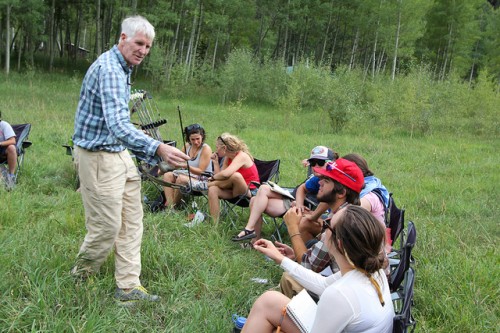 Late last month, 61-year-old Randy Udall shouldered a backpack and set out, alone, into the Wind River Mountains of Wyoming. It was a habit of his: Randy was an experienced outdoorsman, and he periodically retreated from his busy, public life into the solitude of the Wind Rivers. He told his family that he would be home in western Colorado on June 26.
Late last month, 61-year-old Randy Udall shouldered a backpack and set out, alone, into the Wind River Mountains of Wyoming. It was a habit of his: Randy was an experienced outdoorsman, and he periodically retreated from his busy, public life into the solitude of the Wind Rivers. He told his family that he would be home in western Colorado on June 26.
On July 3, after an intensive search, Randy’s body was discovered along the off-trail route he’d planned to follow. He had died suddenly, with his pack on his back and hiking poles still clutched in his fists, apparently of a heart attack or stroke.
Randy Udall was often identified by his relations. After all, he was a son of longtime Arizona congressman Morris “Mo” Udall, a nephew of Interior Secretary Stuart Udall, a brother of Colorado Senator Mark Udall, and a cousin of New Mexico Senator Tom Udall. The Udalls, descended from Mormon pioneers, are the Kennedys of the Rockies, and for generations they’ve championed the region’s often-overlooked landscapes and people.
Randy was an energy-efficiency expert and cofounder of the Community Office for Resource Efficiency, which promoted the use of renewable power in and around Aspen, Colo. Unlike many of his relatives, he worked outside the national spotlight. But as a journalist, I got to see the power and reach of what he did.
I didn’t know Randy well. (For a lovely and much more personal remembrance by his friend and colleague Auden Schendler, along with some of his own writings, see here.) He was a generous longtime source, though, and I often saw him perform — there is no other word for it — on panels, behind podiums, and once, tour-guide style, from the front of a moving bus. Funny, irreverent, and a habitual charmer, he used his charisma to demystify one of the most mystifying, least charismatic and most important subjects on the planet.
He had a special talent for memorable metaphor. We are the Oil Tribe, he said, gobbling up oil faster than his brother Brad once gobbled up a box of Mystic Mints after a 100-mile ski. He liked to compare the energy crisis to being lost in a blizzard, and to point out that the way to survive in the snow wasn’t to find something else to burn, but to conserve as much heat as possible. He calculated that both Cap’n Crunch and dried pig manure contained more energy than oil shale.
Randy was a doer as well as a talker — a creative pragmatist, he found novel ways to promote renewables and reduce greenhouse-gas emissions in his valley and beyond — but his talk was much more than, well, talk. Energy generation, distribution and use is extremely difficult to understand, and often about as interesting to hear about as wallpaper. Randy knew his stuff, and his explanations went down easy. Though he was an advocate, aiming to both enlighten and convince, it wasn’t necessary to agree with Randy in order to appreciate him. He helped his listeners see energy for what it is: the force running through all of our lives, the source of our power and very possibly our undoing, too.
Though we seem to be thoroughly, exhaustingly interconnected, it’s not quite so. Some of our most important global issues are so complicated, distant, or intangible that only a few people are capable of both penetrating them and translating them for others. The great Middle East reporter Anthony Shadid, who also died recently and much too soon, helped build an all-too-narrow bridge between a foreign world and our familiar one. Likewise, Randy decoded the complexities of energy and connected them with his listeners’ lives. He wasn’t the only person able to do so, but he was one of far too few. To lose him now, during this summer of killing heat waves and wildfires, burns especially deep.
Last fall, I met with a group of college students fresh from an afternoon with Randy. To demonstrate the meaning of a calorie, a horsepower, and a kilowatt-hour, he’d had them start a bow-drill fire to boil a quart of water, push a car two-tenths of a mile through the mud, and hike 800 vertical feet. Their delight in the experience was infectious, and their energy palpable. May it always be conserved.
Top: Randy Udall in late 2012, showing off a bow drill. Photo courtesy of the Whitman College Semester in the West.
wonderful, michelle. i have been sadly searching for this kind of report on randy’s death for days, and now you have brought it and more to us. thank you!
Thanks, Rita – more in Auden’s post, http://thinkprogress.org/climate/2013/07/04/2258411/are-you-strong-remembering-randy-udall/
Thank you, thank you, Michelle. After some years of generous-source and sometimes wide ranging phone conversations with Randy, I have always looked forward to meeting him. I’ve been having kind of a hard time with his passing- he seemed so crucial to our times- THE best energy analyst I’ve ever had the great fortune to encounter.
Was lucky enough to have a deep chat with him this winter after his talk – he was our first house guest. He had the ability to empower others to do their best through his humility and enthusiasm. We’ve all got to step up a bit higher to carry on Randy’s passionate work for a healthy planet.